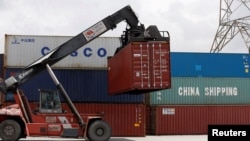Vietnam has placed tariffs on some goods from China. Vietnam accuses China of using its country to avoid similar American tariffs on Chinese goods exported to the United States.
Vietnam’s temporary anti-dumping tax of 2.46% to 35.58% will affect several aluminum products that come from China. The tax will be in place for 120 days.
Shippers based in China were sending products meant for the United States to Vietnam first because it did not demand tariffs.
Manufacturers in Vietnam were marking these products as "Made-in-Vietnam," then shipping them to the U.S.
SSI Research is a financial market research company based in Hanoi, Vietnam’s capital. It called the tariffs “a very bold move for Vietnam.”
It also praised the anti-dumping tariffs as an “efficient” answer from the Vietnamese side to U.S. tariffs to be placed on aluminum products exported from Vietnam but manufactured in China.
Chinese exports of partly-finished aluminum products doubled last year, to 62 tons, as a U.S.-Chinese trade dispute broke out. Of that amount, SSI Research said, “significant quantity is believed to be shipped from China to avoid anti-dumping” and tariffs.
Other Asian countries, Indonesia and Malaysia for example, have ordered their own tariffs on Chinese steel imports. Countries in the area are trying to develop their own steel or aluminum industries. But Chinese exporters can sell for less than others because of the size of their production and supply.
Vietnam absorbs a large share of the Chinese aluminum because it shares a land border and low manufacturing costs, said Song Seng Wun, with CIMB in Singapore. Manufacturing drives the Vietnamese economy, helping it grow at six to seven percent a year.
Economists believe the big increase in imports from China had hurt Vietnam’s own aluminum industry and risked sharper U.S. government examination.
“I do see the Vietnamese trying to be tough on trans-shipments,” said Frederick Burke, a lawyer in Ho Chi Minh City with the international law firm Baker McKenzie.
Burke said the Vietnamese see the Chinese action as “criminal.” He added, “It’s ruining their reputation and they get no benefit out of it.”
Vietnam, like China, also runs a trade surplus with the United States. The imbalance is what led to the Chinese-American trade dispute that is now in its second year.
“We certainly can see that the sweeping power of President Trump can (be) fairly extensive…” Song said. As a result, he said the Vietnamese are less interested in angering the Americans than the Chinese.
I’m Anne Ball.
VOA reporter Ralph Jennings wrote this story. Anne Ball adapted it for Learning English. Caty Weaver was the editor.
Do you think tariffs are a good, or a bad, thing? Write to us on the comments section below. We want to hear from you!
____________________________________________________________
Words in This Story
tariff – n. a tax on goods coming into or leaving a country
anti-dumping – adj. designed to discourage the importation and sale of foreign goods at prices well below domestic prices
bold – adj. not afraid of danger or difficult situations
efficient – adj. capable of producing desired results without wasting materials, time, or energy
significant – adj. large enough to be noticed or have an effect
tough – adj. very difficult to do or deal with
reputation – n. the common opinion that people have about someone or something
benefit – n. a good or helpful result or effect
sweeping – adj. including or involving many things : wide in range or amount






